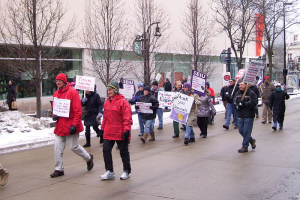An Analysis of the 7th Circuit’s Wisconsin Act 10 Anti-Public Sector Collective Bargaining Law Decision
On Friday last week, the 7th Circuit in Wisconsin Education Association Council vs. Walker (7th Cir. Jan, 18, 2013), affirmed in part and reversed in part the Western District of Wisconsin’s decision in the same case.
The case involves the now-infamous Wisconsin Act 10, which came to international prominence in February 2011 when Wisconsin Governer Scott Walker, under the pretense of a budget crisis, sought to attack public unions by passing legislation which would deny collective bargaining rights to most public sector employees in the state.
That only “most” public sector workers in Wisconsin were covered by Act 10 – most general public sector employees were, but most public safety workers were not – became the basis of the federal constitutional challenges under the First Amendment free speech clause and the equal protection clause in this case.
The Western District of Wisconsin held that Act 10’s distinctions between different types of employees passed constitutional muster as far as the general anti-collective bargaining measure because it met the low-threshold rational basis review standard (there was a legitimate reason for such distinctions). On the other hand, the District Court struck down the anti-dues checkoff and punitive recertification provisions of the law as being without any legitimate basis.


